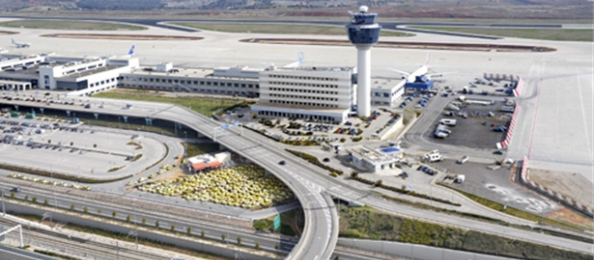Photo: Athens International Airport
AIA's Approach to Corporate Responsibility: Embedding the SDGs
With a corporate goal to create sustainable value to all stakeholders by offering value-for-money services, AIA has implemented a successful development strategy in both its aeronautical and non-aeronautical sectors. With AIA’s operational success being based on stakeholder cooperation, the company operates in a socially and environmentally responsible way, providing stakeholders with an operating and working environment that meets the increasing demands regarding quality, safety, and security issues.
Throughout the years, Athens International Airport S.A. (AIA) has consistently responded to growing sustainability challenges by practicing effective corporate governance and implementing adaptable and innovative entrepreneurial solutions. AIA has effectively responded to emerging adversities and adjusted its strategy in order to continue delivering solid financial and non-financial value to its stakeholders.
AIA approaches corporate responsibility (CR) in an integrated way that aims at promoting the sustainability of all aspects of its operations and development. CR is implemented as a structured governance system, embedding international best practices with respect to planning, implementing, measuring, and transparently reporting on its nonfinancial performance.
AIA’s Policy for Corporate Responsibility is deployed as a cross-departmental effort through a contemporary three-level CR governance structure: CR Strategy (Materiality Analysis and CR Action Plan), CR Integration (alignment with standards and reporting), CR Implementation (embedding across AIA units and departments).
In line with keeping the company’s commitment to the United Nations Global Compact since 2008, AIA has adopted and upheld the related sustainability principles for human rights, labor relations, environmental impacts, and anti-corruption.
AIA has issued its Corporate Responsibility Report annually since 2003. The report conforms to contemporary international sustainability reporting guidelines such as the Global Reporting Initiative Standards (2016), including the GRI G4 “Airport Operators Sector Disclosures,” for which AIA was a major contributor during a two-year international project. Furthermore, the CR report fulfills ongoing commitments made toward the United Nations Global Compact for Communication on Progress.
In order to maximize the added value of the CR reporting process, AIA engages in external assurance by an independent auditing firm for ensuring accuracy and completeness of disclosures as well as adherence to applicable standards.
AIA’s materiality
The development and continuous updating of AIA’s CR strategy is based on the regular redefinition and prioritization of material issues, namely those with a significant impact on the company and its stakeholders.
The Materiality Analysis is an essential corporate practice that identifies sustainability priorities, structures the related CR Action Plan, determines the content of the CR report and constitutes the focus of the independent CR assurance processes. The Materiality Analysis incorporates the input from airport community stakeholders with respect to their perceived influence on material issues.
Linking AIA’s business objectives with the SDGs
AIA acknowledges the SDGs and the United Nations’ Agenda 2030 for contributing to the collective effort of addressing the world’s most pressing social, economic, and environmental challenges. We are fully aware that the SDG agenda cannot be realized without meaningful engagement by the business sector. We are also mindful of our core SDG responsibilities and seek to ensure that our operations do not hinder this agenda and that we address our social and environmental impacts in a coordinated and effective manner.
Hence, the 17 Sustainable Development Goals can be directly correlated with business activities. This is also the case for AIA, as the company’s sustainability approach has a direct impact on most of the Goals. Specifically, for the material issues derived from AIA’s Materiality Analysis, the correlation is mapped in the figure below:
Engaging for the Goals
Our membership in business associations and our presence in various sustainability networking events enable us to demonstrate our practices and share expertise. AIA is an active member of numerous sustainability-related associations, including the local UN Global Compact Network.
AIA recognizes that neither business nor government actions alone will be enough to deliver the transformation toward a sustainable future. We can only realize our joint goals of long-term growth and shared prosperity by collaborating across society. For that matter, AIA has been particularly active in pursuing the critical SDG 17 by exerting its networking leverage to revitalize cooperation for sustainable development. In that respect, AIA contributes to the discussion of aligning the public and private sectors for a common approach to SDGs by hosting relevant roundtable discussions (such as the discussion during the Athens Democracy Forum, organized by the NY Times in September 2016) and by joining the forum for addressing SDGs in the public sector (organized by the Greek Ministry of Foreign Affairs in May 2016). AIA also supports business conferences on the SDGs, such as the one organized jointly by CSR Hellas and the Greek Business Council for Sustainable Development in March 2017.
In conclusion
We at Athens International Airport believe that there is a strong argument for corporate responsibility and accountability and for respecting globally recognized principles as part of our day-to-day operations. This belief is strengthened further when considering how our activities impact the global sustainability agenda. By aligning our sustainability commitments with the “big picture,” we maintain our corporate reputation of being a prudent, respectful, and responsible operator that nurtures employee loyalty, secures our dependability with our business partners, and raises the public’s confidence in us.
Pakis Papademetriou is workins as a manager for corporate quality at Athens International Airport
Eleftherios Venizelos International Airport, the official name of Athens Airport, is a very modern airport.
It opened in 2001 and is the most important intersection for the Balkans and the Middle East.
The airport processes approximately 13 million travellers per year.
There are two terminals, the "Main Terminal" and the "Satellite Terminal", that are connected underground with each other.
The airport is 33 kilometers southeast of Athens.
About Us // Privacy Policy // Copyright Information // Legal Disclaimer // Contact
Copyright © 2012-2018 macondo publishing GmbH. All rights reserved.
The CSR Academy is an independent learning platform of the macondo publishing group.









